Critics of the St. Louis Blues’ general manager Doug Armstrong have plenty of ammunition this season, as the team is off to an abysmal 11-14-4 start. Despite being named by national pundits as the winner of the offseason, Armstrong is now under intense scrutiny as the roster he’s built clearly isn’t getting the job done.
One of the most common complaints about Armstrong is his tendency to hand out bad contracts. But is this a fair critique? We’ll be taking a look at this claim in this article, first by examining the contracts on this current roster, and then by looking at a few more of Armstrong’s best and worst deals.
Exemptions: ELC’s, League Minimum, O’Reilly, Schenn
As we investigate the Blues’ contracts, there will obviously be a few exemptions. First of all, we won’t be looking at the contracts of young players on entry-level contracts, as these are standard deals that Armstrong isn’t really responsible for. This exemption includes players like Robert Thomas, Zach Sanford, Ivan Barbashev, Jordan Kyrou, and Vince Dunn.
Furthermore, players on deals at roughly league minimum ($650,000) or within range of that (under $1 million) will be exempted because of the relative insignificance of these contracts. This includes Oskar Sundqvist, Jordan Nolan, Jordan Schmaltz, Chris Butler, Jordan Binnington, and Robby Fabbri.
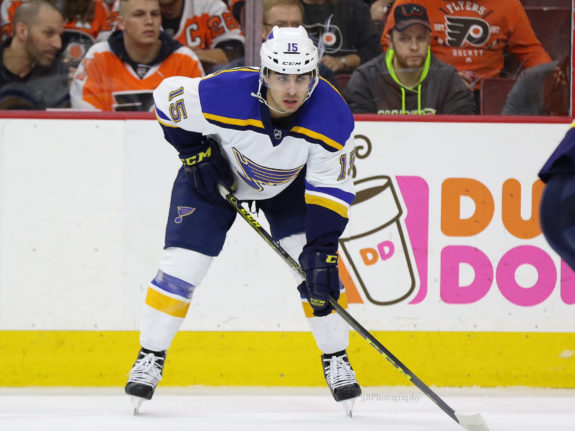
Finally, it would obviously be unreasonable to pin contracts that Armstrong didn’t sign on his resume. Therefore, the contracts of Brayden Schenn and Ryan O’Reilly won’t be discussed, though both happen to be very good deals.
In the following contract descriptions, the deals will be described by term remaining and annual average value (AAV).
Forward Contracts
Vladimir Tarasenko: A+ (5/$7.5 million, NTC beginning 2019-20)
The Blues have questions surrounding Vladimir Tarasenko, including the lingering rumor that they might be willing to trade him in order to shake up the Blues’ roster. But one thing that isn’t worth much debate is Tarasenko’s contract, which is an absolute steal of a deal.
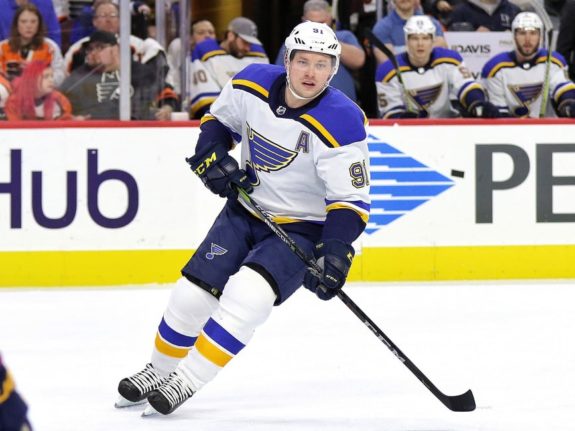
Fourth in the league in goals in the last four seasons, Tarasenko’s deal comes at an absurd $7.5 million over the next five years, an identical deal to Ryan O’Reilly’s. Despite the team’s frustrations with his consistency, there’s no question that this deal is one of Armstrong’s best, and an absolute steal.
Alexander Steen: D (3 years/$5.75 million, NTC)
It’s easy to understand why Armstrong offered Alex Steen this contract when he did. At the time, the Blues had just lost captain David Backes and fellow experienced leader Troy Brouwer to free agency, and were looking to shore up a veteran presence on a team that had just made it to the Western Conference Final.
But, committing to Steen for (at the time) five more years when he was already 32 was always a questionable decision. And now that Armstrong is taking aim at the Blues’ leadership core, of which Steen is a significant part, the AAV and NTC on his deal make him very difficult to move.
Jaden Schwartz: A (3 years/$5.35 million, modified-NTC beginning 2019-2020)
No one will debate that Jaden Schwartz’s $5.35 million contract isn’t a steal. He’s an integral part of the Blues’ offense when healthy, and was voted the league’s second most underrated player by his peers last year. Schwartz’s one issue has been staying healthy, but as that’s not something one can base a contract on, no one can hold Armstrong accountable for his frequent trips to the injured reserve.
Tyler Bozak: C (3 years/ $5 million, modified-NTC)
This contract is still young, and has the possibility of going either way, though I suspect many fans will want the grade to be lower right now. Bozak hasn’t shone brightly in the first two months with his new team, collecting just 11 points in 29 games, which puts him on pace for a meager 31 on the full season. He’s a minus-8 on the year, and his 46.5% Corsi For % (CF%) is below his career mark.

With that said, we’ll give Armstrong a pass, temporarily. Bozak was signed at a point when the GM feared the O’Reilly trade wouldn’t materialize. Perhaps that isn’t an excuse, but fans would not have forgiven him if he’d failed to get any center help in the offseason. And Bozak’s skills will not shine on a team that is struggling as badly as the Blues have been.
Until the team improves, we can’t fairly evaluate Bozak’s role on it. And even if he isn’t a good fit for the team, the two remaining years after this season aren’t a devastating price to pay on a bad free agent deal.
David Perron: B (4 years/ $4 million, modified-NTC)
David Perron owns one of the most interesting little trivia facts in hockey: though he’s played for five different teams in his career, he’s never signed a contract with anyone but St. Louis. I am high on Perron’s contract for a number of reasons. First, $4 million isn’t an unreasonable price to pay for 15-20 goals in today’s NHL. Second, Perron is an agitator, which can result in unnecessary offensive zone penalties (something he’s famous for in St. Louis), but is an element of grit the Blues need.
Most importantly, there is no question that Perron could have gotten more money on a contract as a free agent coming off a career high 66 points with the Vegas Golden Knights, but, as he did two years ago, he took less to return to his beloved Blues. $4 million dollars can rarely hurt a team, especially as the salary cap ceiling climbs, and, if worst comes to worst, Perron could once again be a candidate for the expansion draft in 2021.
Patrick Maroon: D (1 year/ $1.75 million, NTC)
It was a tremendous idea: bring Patrick Maroon back at an extreme discount to make him the Blues’ big, physical hometown hero. But, it hasn’t worked. Maroon has looked positively lost, with eight points in 23 games, and he is a team-worst minus-15. Initial rumors that Maroon had a handshake agreement with Armstrong for an extension haven’t come to fruition, and right now, many fans are hoping they won’t.
Nothing would make Blues’ fans happier than to see “the Big Rig” revive his season in the second half and create same great memories in the Blue Note. But at present, all that’s keeping this contract from being an “F” is that it was a one year deal. Right now, Maroon is doing more harm taking playing time from youngsters than he is helping the team.
Defensemen Contracts
Alex Pietrangelo: A+ (2 years/ $6.5 million, NTC)
Alex Pietrangelo has his critics, for some reason, with some questioning whether his leadership of the team as its captain is sufficient to the task. Whether he’s right for the ‘C’ or not, his contract is an absolute steal. Paying a defenseman of his caliber, who logs 25 minutes a night minimum, just $6.5 million is incredible, and when his next deal is signed, expect it to at least mirror if not surpass the one John Carlson signed this summer.
Colton Parayko: A (4 years/$5.5 million)
Colton Parayko is also beginning to see occasional criticism from Blues’ fans (it seems no one is exempt this season) but his deal is still very team friendly. He’s a much respected young defenseman around the league, and his size and his slap shot alone are worth $5.5 million.
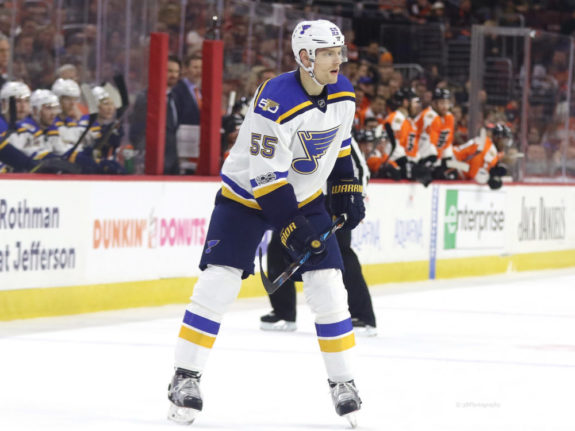
It remains to be seen whether Parayko will ever quite develop into the elite defenseman the Blues once hoped he might be, but he’ll always have value. And the fact that there is no trade protection anywhere in his contract ensures that the Blues will have lots of flexibility with Parayko for the duration of his deal.
Jay Bouwmeester: B (1 year/$5.4 million, NTC)
Here’s another contract that fans will want to be graded lower, but understood in the context of its time, it makes sense. The fifth year on this deal is really killing the Blues, as Bouwmeester is clearly a step (or more) behind in today’s NHL. But when he signed his deal in 2013, Armstrong needed to offer the fifth year to lower the AAV.
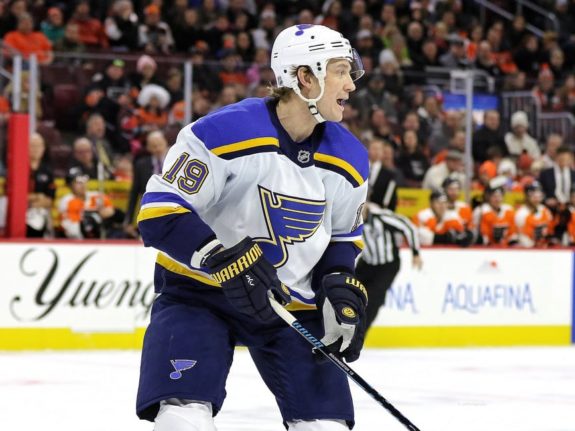
For the most part, Bouwmeester has been exactly what the Blues traded for: a top-pairing defensive partner for Alex Pietrangelo — they even partnered for Team Canada at the 2014 Olympics. Perhaps the fifth year was a mistake, but Armstrong couldn’t have expected the NHL iron man he traded for to struggle with so many injuries at the end of his contract. It looks bad right now, but overall this has been a very good contract for the Blues.
Joel Edmundson: C (1 year/$3 million)
The only drawback to Edmundson’s contract is that it isn’t longer. The Blues locked up Edmundson at $3 million dollars this summer to avoid arbitration, but didn’t have enough cap flexibility to give him a longer term. There’s little doubt Armstrong will get it done this summer, but another season of proving how valuable he is has probably raised the price.
Carl Gunnarsson: C (1 year/$2.9 million)
Carl Gunnarsson has been serviceable for the Blues when he’s been healthy, and the $2.9 million he’s made each of the last three seasons has been a fair price to pay. He suffered from an ACL injury that cost him a significant chunk of the last season, and is on the shelf again, but when he’s been healthy, even this season, the Blues have been better for it.
Robert Bortuzzo: B (1 year/$1.15 million)
Despite his practice scuffle with teammate Zach Sanford earlier this week, Robert Bortuzzo is everything the Blues could hope for in a third pairing defenseman. He’s experienced, he’s capable of playing up and down the lineup, he’s determined, and he’s physical. The two year, $2.3 million deal he’s on is perfect.
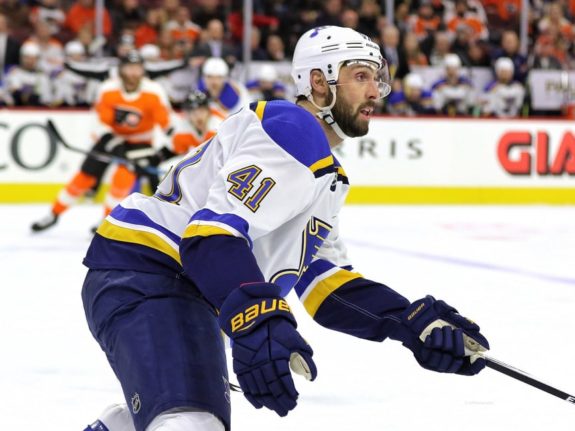
The Blues have a lot of defensive contracts coming off the books this season, with Bouwmeester, Gunnarsson, and Bortuzzo set to become unrestricted free agents. Assuming he doesn’t demand a big pay raise, the Blues might be wise to bring Bortuzzo back on a short-term agreement.
Goaltender Contracts
Jake Allen: F (3 years/$4.35 million)
Jake Allen’s contract is emblematic of Armstrong’s biggest weakness: committing to a player too early. Allen came due for a contract extension before he’d really proven himself as a true number one starter. The Blues chose to trade Brian Elliott and commit to Allen with a four year, $4.35 million extension. Since then, Allen has had brilliant stretches, but they’ve been marred by long periods of time where his play fell off a cliff.
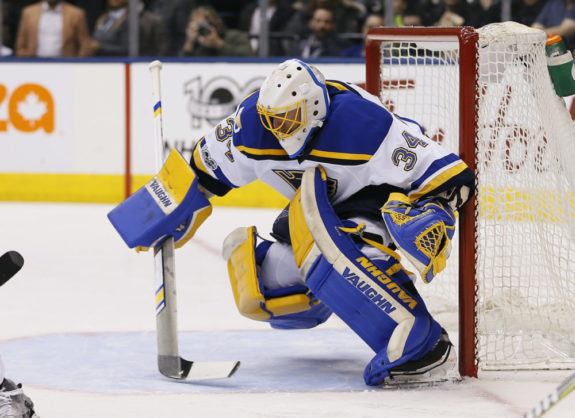
Now the Blues are saddled with three more years of a contract on a goaltender whom Armstrong and large sections of the fan base don’t seem to trust anymore. There are plenty of rumors linking the Blues to other goaltenders, but unless they’re able to get out from under Allen’s deal in the process, they may not be able to afford it.
Current Roster Grade: B
Some fans may disagree with it, but the current Blues contract structure is, on the whole, fairly positive. There are a few really tough contracts to navigate, particularly with Jake Allen and Alex Steen, but overall, Armstrong has done very well constructing the current team.
The Blues have flexibility as well, with $14 million coming off the books at season’s ends between the expiring contracts of Bouwmeester, Gunnarsson, Edmundson (who of course will be re-signed), Bortuzzo, and Patrick Maroon. That’s a lot of money for Armstrong to play with, especially as the cap ceiling is increasing once again.
Gary Bettman says salary cap projection for next season is around $83 million.
— Darren Dreger (@DarrenDreger) December 3, 2018
The Blues will have approximately $18 million to spend, with an owner whose shown willingness to spend to the cap in the past, and an impending free agent class that could be very strong. The Blues are at the heart of the league’s rumor mill right now, with Armstrong apparently telling rival GMs that no player on the roster is untouchable.
The worst contracts on the team will obviously be the hardest to unload, but I don’t think the Blues have any players that truly cannot be traded. Armstrong has shown willingness to part with assets to jettison contracts he no longer needs in the past, and the time may be coming for him to do so again.
Armstrong’s Best Deals
The other strong argument in Armstrong’s favor is the great deals he’s signed over the years. Most of those are still on the roster, in the likes of Alex Pietrangelo, Vladimir Tarasenko, Colton Parayko, and Jaden Schwartz. But let’s take a brief look at a few other great contracts he’s signed for the Blues.
T.J. Oshie (5 years, $4.175 million)
Two years before the Blues traded T.J. Oshie to the Capitals, they signed him to a very respectable five year, $4.175 million deal. Over those five years, he recorded a very respectable 242 points and 106 goals. It was a great output for the young player, and who could forget when he became a national hero at the Sochi Olympics?
Trading Oshie may have been one of the bigger mistakes of Armstrong’s tenure, but the contract certainly wasn’t. It was one of the better negotiations of his career.
Brian Elliott (Three Different Contracts)
It would be unrealistic to give Armstrong too much credit for Brian Elliott’s first deal with St. Louis, as it was nothing more than a tryout contract. But when “Moose” delivered and became a legitimate number one for the Blues, Armstrong delivered with two follow-up deals, the first for two seasons at $1.8 million, the second at three seasons for $2.5 million.
It would be easy to scoff, given Elliott’s struggles since leaving St. Louis, but he had a simply phenomenal tenure with the Blues. Over five years, he had a .925 SV% and a 2.01 GAA, and he racked up 25 shutouts, making him the career leader in that category for St. Louis. Considering that he has Glenn Hall, Grant Fuhr, Curtis Joseph, and Mike Liut as competition, it’s a remarkable achievement, and for Armstrong to never pay more than $2.5 million for that level of output is simply phenomenal.
Armstrong’s Worst Deals
Armstrong has made a habit of offering some pretty bad deals as well. On the one hand, credit is due to him for frequently being able to offload the contracts. However, he shouldn’t have signed them in the first place, so the blame is still on him. We’ve discussed some of his worst contracts already, with Allen, Steen, and possibly Bozak. But he’s already traded a few of his very worst deals. Let’s take a look.
Patrik Berglund (5 years, $3.85 million, modified-NTC)
Perhaps Berglund’s contract can be chalked up to bad timing. The final season of his last deal saw his highest goal-scoring output, 23, and it looked like the big Swede was having a mid-career resurgence. Even so, the five year deal Armstrong offered never made sense, even at a dollar value under $4 million.
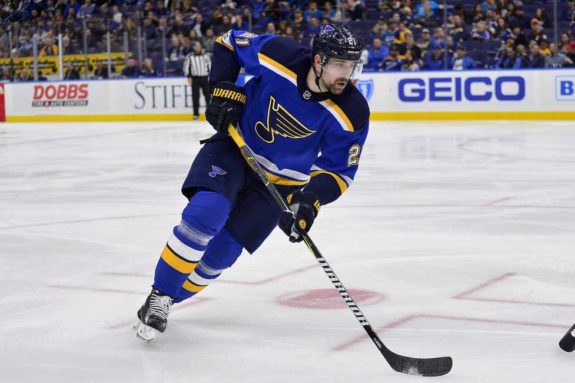
Things quickly soured for Berglund, whose 2017-18 season saw 17 goals, but only nine assists in 57 games. He was quickly labeled a “passenger,” and Armstrong shipped him out as part of the salary-neutral deal for Ryan O’Reilly. So far, he has only four points in 23 games with the Sabres. Perhaps Berglund provides leadership and experience for fellow Swede Rasmus Dahlin, the first overall pick in last year’s draft, but he isn’t providing much else. Berglund’s contract looks worse and worse. Thankfully, it isn’t Armstrong’s problem anymore.
Vladimir Sobotka (3 years/$3.5 million)
Vladmir Sobotka was once a fan favorite for St. Louis, before he left the NHL for three seasons to play closer to home in the KHL. When Doug Armstrong brought him back, he did so sight unseen at the price of $3.5 million per year for three seasons.
Sobotka simply wasn’t the same player when he came back to the States. He expressed discomfort playing at center, where the Blues needed his skills, and posted just 31 points in his one full season back. He was unloaded along with Berglund in the O’Reilly deal, and has just five points in 28 games.
Jori Lehterä (3 years/ $4.7 million)
Jori Lehterä has a strange history with the Blues. Originally drafted high in the third round in 2008, he continued to play in the KHL, and it looked like he might never make the jump to the NHL. When he finally did, unexpectedly, Lehterä found immediate chemistry with Vladimir Tarasenko, and had a terrific 44 point season as a plus-21 player.

Even with the breakout performance, Armstrong’s decision to extend Lehtera for three years at an outrageous $4.7 million after just one season was head-scratching from the very beginning. He took a huge step back in his second season, such that the extension looked bad before it even came into effect. Armstrong managed to unload Lehterä in the trade to acquire Brayden Schenn, but it certainly cost them more to do so.
Final Grade: C
There is little question that contract negotiations are one of the weaker parts of Doug Armstrong’s repertoire as a general manager. But on the whole, has he really been that bad?
The answer is yes and no. He has given out some truly head-scratching deals, particularly the three we’ve just discussed, and the fact that he’s gotten out from under them repeatedly is not an excuse for his giving them in the first place.

With that said, Armstrong’s worst deals don’t come close to some of the worst in the league. Most teams have at least one deal that is worse than any on Army’s roster right now. Armstrong has avoided the six, seven, or eight year bad extensions that truly sink a team for the long haul.
So while he has made some very questionable deals over the year that have gone pear-shaped quickly, he’s never seriously handicapped his team long term with any of those deals, and he’s had about as many amazing deals as he’s had bad ones. All told, a “C” grade feels appropriate, as he could be much better, but he could be worse as well.
The Blues’ general manager will continue to be under a microscope unless the team takes a dramatic turn for the better. Though he’s on a fairly new extension, his seat is getting warmer as the team continues to struggle. In the past, he hasn’t hesitated to make a big move to shake up his team. And if he has any hope of saving this season, that move would need to come sooner than later.